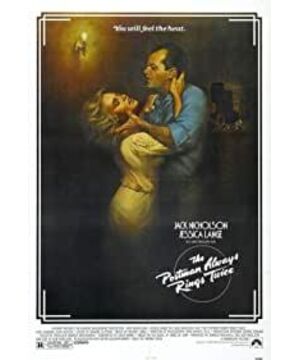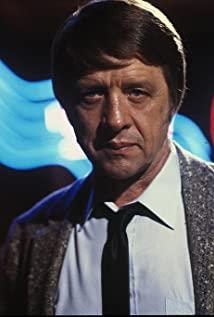The 1981 version of The Postman Always Rings the Doorbell Twice was a remake of the 1946 film of the same name, but the 1981 version achieved far less artistic success than the 1946 original. The two stories are told in the same way, and the key plots are handled in the same way. Why is there such a big difference? If it is only explained by "one trick fresh", it is difficult to prevaricate the past.
In all fairness, the 1981 version of "The Postman Always Rings the Doorbell Twice" is better than the 1946 version in terms of handling the details of life and grasping the rhythm of the story. Much of the narrative in the original was pretty straightforward, but in the 1981 edition, that got a big twist.
For example, at the beginning of the film, Frank, the protagonist of the 1946 version, saw a roadside job opening to apply for a job, while in the 1981 version, Frank went to the Double Oak Restaurant not to apply for a job, on the one hand to get rid of the original hitchhiker, on the other hand In order to get free food, it was Nick, the owner of Double Oak Restaurant, who decided to hire Frank when he saw that there was a bargain.
The advantage of this narrative technique in the 1981 edition is that the narrative is freed from the simple narrative function, and a small incident expresses the character and psychological activities of the characters. A greedy boss and a wandering old fritter have been highlighted. This also makes the story full of the fireworks of life from the very beginning. The characters are already expressing themselves, and there is no need for the director to tell the audience who he is, what character and hobbies he has, etc. It is only shown in one scene.
Anyone who has watched both versions knows that the 1946 version has a narrative auxiliary line that is Prosecutor Sek. This character appears at the beginning of the film. As a representative of the law, he has been monitoring the protagonist Frank with a strong sense of fate. move until the movie ends. In the 1981 version, this contrived sub-line was cut out entirely, and Prosecutor Seck only appeared when the story involved litigation. The benefits of this are also obvious, cutting out the branches and plots, so that the focus of the story is only on the protagonist, and at the same time, it can speed up the narrative rhythm.
The major changes made in the 1981 version compared to the 1946 version are that the 1946 film has a hypocritical and contrived exhortation ending. After the car accident, Frank was prosecuted for the murder of Cora. Although it meets the needs of the film's emotional development, it goes against common sense and common sense. Legal knowledge. The 1981 version ended the film after Cora's death, cutting off the dog's tail of admonition, avoiding the fly-eating feeling that we commonly encounter when watching the Mandarin version of Hong Kong films.
So, is the 1981 version better than the 1946 version? This is far from the truth. The screenwriter of the 1981 edition was David Mammy. As a critic and teacher, he had sharp eyes and sharp mouths, and could spot the flaws in other people's scripts at a glance. Therefore, some of his revisions to the 1946 edition were of a high standard. There is no doubt about this. .
But this person can also be called the American version of Zheng Dongtian. As soon as he gets started, the first-class critic immediately becomes a third-rate screenwriter, and he has the ability to make the script terrible, and this adaptation is also the same.
The most significant adjustment that David Mamey made to the script of "The Postman Always Rings the Doorbell Twice" was to remove the film noir elements from the script. Get boring.
One of the most central elements of film noir is the destruction caused by greed. From "Sunset Boulevard" and "Double Indemnity" to "White Heat" and "Night at Night", this is the case. The same goes for 1946's "The Postman Always Rings the Doorbell Twice." The protagonist Frank is a vagabond who is seduced by the heroine Cora and walks into the abyss step by step, unable to turn back. But Frank is not destined to be like this. He starts the film with a clean background and an infinite possible future, and it is the fate of the film that makes his other possibilities vanish.
In David Mamet's 1981 screenplay, Frank showed his dark side from the beginning, and his demeanor already showed that the man could no longer be satisfied with his daily normal life because of his long wandering life; then After eloping with Cora, David Mamet let Frank win money by gambling with people at the bus station; after killing his boss Nick in a car accident, he told Frank's history through the mouth of Prosecutor Sek: robbery, imprisonment...
In the 1981 version, perhaps Frank's character was closer to real life, but it was difficult to get audience recognition. The theme of the 1946 version of the film is the destruction caused by greed. Frank is in a critical period of transformation, and the dramatic tension is full, but for the 1981 version of Frank, life has already been destroyed at this time, and now it is just a process of continuing to fall, when. You don't see any effort by the current Frank to say goodbye to the past.
The Twin Oaks restaurant in the 1946 version was the target of greed. It was the owner Nick's decision to sell the Double Oak that led to Cora's murder. By the 1981 version, the Double Oaks Restaurant had become a small roadside shack, and killing people for that shack was unimaginable, so David Mamet made up an even more outrageous plot where Nick became a Greek with countless people. Qing's friends and relatives, which makes Cora and Frank's elopement impossible, so the erotic lovers can only kill Nick for love. In other words, fuck Nick.
Destroying beautiful things for you to see, this process is full of dramatic tension, attracting attention, and easy to resonate with the audience, but if you smash the destroyed things again, I am afraid that few people will be interested. For David Mamey, maybe the details are more important than the subject, maybe he wants to make the bumbling couple into Bonnie and Clyde, so he can consistently screw up one after another 's script.
The femme fatale is one of the other important features of film noir. Cora in the 1946 version was played by Lana Turner, dressed in a cool white dress. The character has not yet appeared, but a tube of lipstick rolled out of the screen, and before the person arrived, the provocative atmosphere was already rushing towards him. In the 1981 version, Cora, played by Jessica Lange, was too bleak. I saw a burly middle-aged woman kneading her face. At this time, Frank deserved to be a low-class person. Is it because she fell in love with this burly woman because she wanted to give birth to a baby?
In the 1946 version, many times, we don't fully understand what this glamorous woman is thinking. This Cora has always maintained a mysterious beauty. Her utilitarianism and calculation are not always written on her face. Frank remained elusive, but she would definitely make the key decision without hesitation. In the 1981 edition, David Mammy turned Cora into a killer version of "Long Dreams of the Covered Bridge". While enjoying his own lust, he murdered her husband Nick. David Mammy may have catered to the women's rights at the time. Movement, trying to understand the heroine with sympathy, but this understanding of sympathy did not bring the brilliance of humanity to the character Cora, but slapped the character himself. You know, on the screen, the audience would rather like a glamorous bad woman than a lustful stupid woman. pity her? Maybe, love? That's hard.
After David Mamet stripped away the film noir elements of the 1946 version, the story of The Postman Always Rings the Doorbell Twice was literally washed down and turned into a sympathetic understanding of a born criminal and lustful The story of a stupid woman colluding with her husband to murder her husband. This story has been completely broken and the martial arts are completely useless. Although the two stories still have the same narrative technique and the same key events, they do not have the same spiritual core in essence. The same sense of substitution does not have the same attractiveness.
What is an adaptation that discards its essence and takes its dross, and what is an adaptation that turns the deep into the superficial, David Mammy gave us a vivid lesson.
View more about The Postman Always Rings Twice reviews











